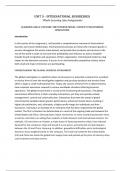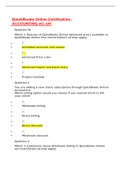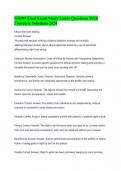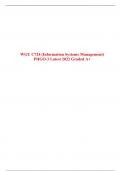Essay
*NEW*Unit 5 International Business - (Whole Assignment) - DISTINCTION*Graded
- Institution
- PEARSON (PEARSON)
*Certified Distinction Grade Work* Contains and covers all aspect of Unit 5 International Business Learning Aim A,B,C,D, and E with the highest quality: Contains every, pass merit and distinction tasks: p1,p2,p3,p4,p5,p6,p7,p8,m1,m2,m3,m4,m5,d1,d2,d3,d4 International businesses play a crucial role...
[Show more]












